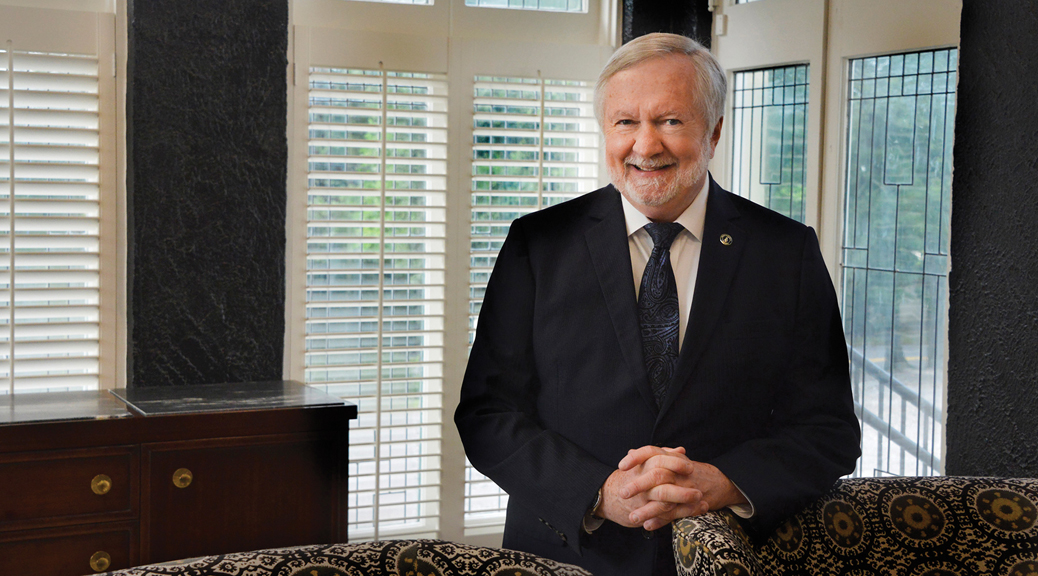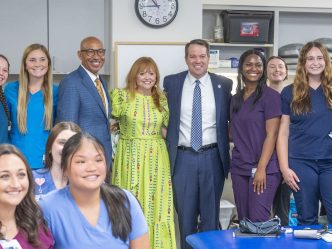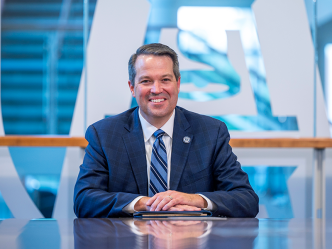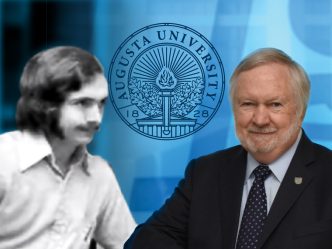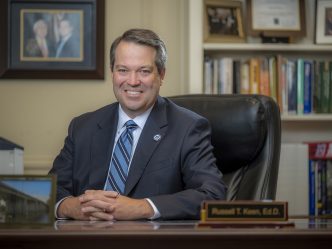Not surprisingly, many of this year’s top stories involved Dr. Brooks Keel, who on July 8 was announced as the Board of Regents’ unanimous choice to succeed Dr. Ricardo Azziz as president of what was then Georgia Regents University.
Keel officially took office less than two weeks later, and less than two months after that, he was given the task of shepherding the institution through another name change, when the Board of Regents decided to rename Georgia Regents University to Augusta University.
This story, published the day the Board of Regents voted him in a president, served as Keel’s introduction to what he immediately began referring to as Jaguar Nation.
Brooks Keel is coming home. Home to the city where he grew up. Home to the school where he received his undergraduate degree. Home to the campus where he earned his doctorate.
Home to lead his united alma maters into a bold and exciting future.
“For me, personally and professionally, this is a dream job,” he said. “It’s the job of a lifetime.”
While that’s the kind of thing you expect the newly appointed president of a prestigious university to say, Keel is convincing in part because he’s always been so vocal about his love for Georgia Southern University, where he spent the last five and a half years building programs, making friends and becoming something of a folk hero.
[mks_pullquote align=”right” width=”300″ size=”24″ bg_color=”#ffffff” txt_color=”#0e314b”]“For me, personally and professionally, this is a dream job. It’s the job of a lifetime.[/mks_pullquote]
“It’s not a matter of me wanting to leave Georgia Southern,” he said, sitting in his spacious, comfortable office in Statesboro. “I didn’t wake up one morning and think, ‘I want to leave Georgia Southern.’ I don’t want to leave Georgia Southern. What I want to do is go to GRU.”
That kind of honesty is one of the reasons he’s received such an outpouring of affection from his beloved Eagle Nation. A peek at his Twitter profile (yes, he uses Twitter) shows a level of intimacy that’s surprising for an administrator of his stature.
“Even though you are moving on from GSU, I’ll always have this on my diploma!” one former student tweeted, along with a photo of Keel’s signature on his diploma. “Thanks for everything.”
Another student tweeted a selfie she took with Keel. “That one time I met the president in front of the White House,” she wrote. “I looked like such a college kid.”
Keel’s response? “You looked like the future, and that’s a wonderful sight! Take your @GeorgiaSouthern education and change the world!”
Not only has Twitter proved fun for Keel, who’s been tweeting for just over a year, it’s also turned into a great way for him to interact with students and for students to see their president as a person rather than a position.
In fact, getting a selfie with the president has actually become a Bucket List item for many students at Georgia Southern, and Keel’s accessibility makes that possible.
“I go to Starbucks every morning for breakfast, and that’s an opportunity for me to walk across campus and be seen,” he said. “And if I’m in town and don’t have a meeting going on, I usually carve out lunchtime so I can go to the dining commons and interact with folks.”
That’s something he plans on continuing at GRU.
“It gets to that outward-focused opportunity that I think a president needs to have here,” he said. “Even more so now because of the consolidation, I think people are looking for a central direction to go in that brings all entities together, and having a president that is more outwardly focused is going to be critical for that at this point in time.”
Keel’s experience seems a natural lead-in to his new role. After graduating with a Bachelor of Science in biology/chemistry from Augusta College and then earning a doctorate in reproductive endocrinology from the Medical College of Georgia, Keel went to the University of Kansas School of Medicine-Wichita, where he rose from assistant professor to a full professor with tenure in seven years. Three years later, he was awarded an endowed chair. He also had his own NIH-funded lab, was associate dean of research and CEO of the Women’s Research Institute.
Sixteen years later, however, he decided his real love was administration, so he moved to Florida State as associate vice president for research. From there he went to Louisiana State University to become vice chancellor for research and economic development. While in Baton Rouge, he brought video game giant EA Sports into the same building as the university’s varied computer science programs, a move that now benefits both students and the private sector.
Keel believes having a business mindset is vital in higher education.
“People insist that it’s not a business, that it’s providing education,” he said. “Well, I get that, but I don’t know of any business that’s more of a business than this business.”
That said, he believes in letting the experts do what they do best. Point the direction and get the heck out of the way.
“When you get a university as complex as Georgia Regents is now, there’s no Superman or Superwoman who has all the characteristics and experience rolled into one,” he said. “You have to find someone who has the bulk of the experience, but is also a person who relies heavily on having executive vice presidents around that are experts.”
Another thing that’s important, he said, is knowing the landscape.
In the current climate, where enrollment is declining across the state, he said it’s important to treat students like customers.
[mks_pullquote align=”left” width=”300″ size=”24″ bg_color=”#ffffff” txt_color=”#0e314b”]“It’s an incredibly competitive market for students, and if you don’t treat students like they’re people and like they’re important, they’re going to go somewhere else.”[/mks_pullquote]“Education is not a commodity – I fully appreciate that and realize it’s an opportunity that we’re passing on to young people – but you’ve got to treat these young people like your very job depends on it, because believe me, it does,” he said. “It’s an incredibly competitive market for students, and if you don’t treat students like they’re people and like they’re important, they’re going to go somewhere else.”
All of which makes promoting the university that much more important.
Keel is well-known for devoting time and money to the Georgia Southern athletic program, particularly football. He expanded Paulson Stadium to seat 25,000, moved to the Sun Belt Conference and inked a lucrative deal with Coca-Cola – all things that dramatically raised the school’s exposure.
“I used athletics as a way to get the Georgia Southern name on the national stage,” he said. “And although GRU doesn’t have football, it does have nationally recognized athletics as well as other things. It’s got the only public medical school and the only dental school in the state, and it’s got the Cyber Institute, which are all marquee programs that we can market the heck out of. I want some kid in Spokane, Washington, who’s thinking about medical school or cybersecurity to think about Georgia Regents.”
Having a thriving undergraduate campus that’s rich with sports and culture is not just important to the internal pride of the institution, he said, it’s also a way to lift up the greater community.
“The role that GRU has got to start playing more significantly is helping Augusta be a destination city,” he said. “When you’re recruiting big companies and even small companies to come into the area, they want to be in a vibrant place that’s got a lot of social opportunities. Performing arts and concerts and all the things that a vibrant undergraduate campus offers add to that overall quality of life, and that’s a key piece to being able to recruit businesses into the community. We have a fantastic opportunity to play a role in that area.”
While that consideration for the greater community comes with the job, it means a little more when you’re actually a product of the community.
The son of a maintenance supervisor and a job-trained nurse, Keel was born at St. Joseph’s Hospital, spent the first few years of his life on Broad Street Extension, and then moved with his family up to Highland Park. He went to Monte Sano Elementary, Tubman Middle School, and Richmond Academy before following his older brothers to Augusta College. Grice, the oldest, eventually transferred to UGA, but David graduated from Augusta College. The two still live in the area, and currently two of Keel’s nieces work at GRU – one as a manager in the Emergency Department and the other as a chemistry instructor on the Summerville Campus.
“My roots in Augusta run deep,” he said.
Keel’s wife, Dr. Tammie Schalue, is an off-site lab director as well as an administrator for an association management firm, both jobs that allow her to work from home. An accomplished scientist and scholar, she is as excited as he is to be back in a biomedical research environment, Keel said.
Their daughter Sarah, a graduate of the Savannah College of Art and Design, lives in Philadelphia and is a fashion designer for Anthropologie, and their son Preston is a pharmacy tech at GRU.
Keel spent his young life around Daniel Village – his best friend got his private pilot’s license, so they’d fly Piper Cubs out of Daniel Field – and like most Augustans of a certain age, he remembers Squeaky’s Tip-Top, though not as much as some, since as an undergraduate his social life revolved around his fraternity, Pi Kappa Phi. Fraternity brothers include Dr. Marc Miller, dean of the Hull College of Business, and Shawn Vincent, vice president of partnerships, international health care and strategic affiliations.
Interestingly, Keel said it wasn’t the beer he remembered at Squeaky’s, but the pizza.
“They had the best pizza I had ever, ever eaten,” he said.
Given his background, Keel is in a unique position to understand the sensitivity many in the community feel regarding the consolidation process.
“That’s one of the things when I was interviewed that I made very plain,” he said. “If you’re going to make GRU a destination campus, and through GRU make Augusta a destination city, one of the key components is acknowledging that the Summerville Campus is the community’s college. It’s the university of the CSRA, and people want it to be available to their sons and daughters.”
[mks_pullquote align=”right” width=”300″ size=”24″ bg_color=”#ffffff” txt_color=”#0e314b”]”We’ve got a fantastic opportunity to expand that to where the city not only sees Augusta College as their college, but they see GRU as their university.”[/mks_pullquote]The loyalty and pride the community has for the Summerville Campus is an asset he intends to build on.
“I think we’ve got a fantastic opportunity to expand that to where the city not only sees Augusta College as their college, but they see GRU as their university.”
And that new university is something he thinks everyone should be proud of.
“There are a lot of things that the university has never had before,” he said. “The Summerville Campus never really had the high-powered research component that the Health Sciences Campus brings, and the Health Sciences Campus never really had the comprehensive aspect of what an undergraduate campus brings. The consolidation created a totally different university with a lot of unique challenges, but more importantly, a lot of tremendous opportunities, so it’s the best of all worlds.”
Even better, he said, is the fact that he gets to be the one to run it.
“I feel like for the last 30 years,” he said, “I’ve been specifically preparing for this job.”
 Augusta University
Augusta University
